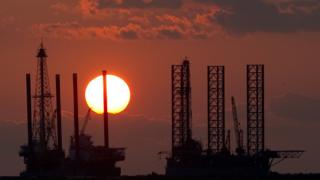According to a poll of Bloomberg subscribing analysts, traders and investors, 49% believe the Organization of Petroleum Exporting Countries will have to lower its production target this year because US frackers will not stop pumping. 34% said shale drillers will lower output in time to save OPECers the trouble. Seventeen percent weren’t sure. In other news, Algeria is considering increasing it's oil output in order to make up for falling revenues, a move certain to tempt other OPECers to increase their output which will precipitate another round of oversupply and price cuts. Look for the $1/gal gas coming to a station near you this spring or summer.

OPEC Will Blink in Battle With U.S. Shale Drillers Poll Shows - Bloomberg

OPEC Will Blink in Battle With U.S. Shale Drillers Poll Shows - Bloomberg


